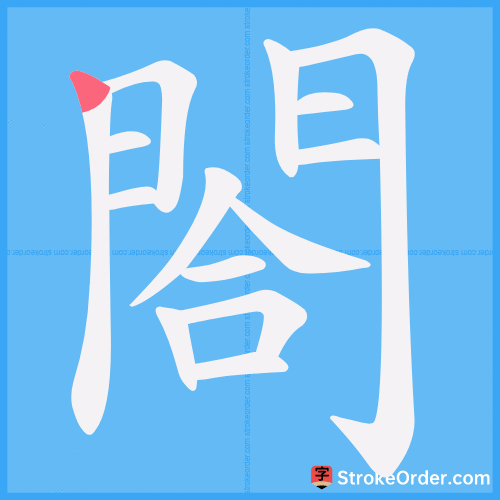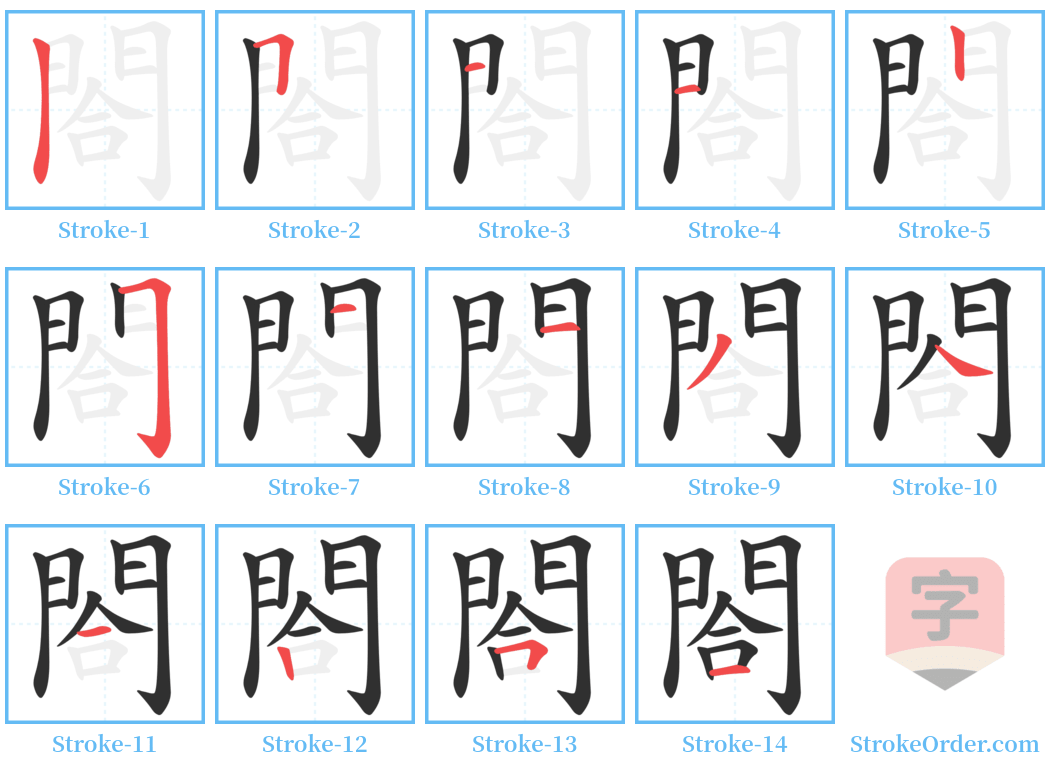閤 Stroke Order
Animated Stroke Order of 閤

Stroke Order Diagrams for 閤

Step-by-Step Handwriting Guide for 閤

Learn to Write Chinese Characters with Video Tutorials
Watch the video of writing the Chinese character "閤", learn the correct stroke order (笔顺) of the character "閤", and master the standard way of writing the character "閤".
Free Printable Handwriting Practice with Stroke Order: 閤
Printable Writing Practice Worksheet of "閤" in Portrait Orientation (Tian Zi Ge)

Printable Writing Practice Worksheet of "閤" in Landscape Orientation (Tian Zi Ge)

Information of 閤
Pinyin
gé、 hé
Radical
門
Strokes
14 strokes
Usage
★★★
Definition
-
閤:
1. 全;总共。
(1) Entire; altogether.
2. 闭合。
(2) To close; to be shut.
Verb: To close or fold. "Shuowen Jiezi": "合, 合口也."
Example: "他笑得合不上嘴。" (He laughed so hard he couldn't close his mouth.)
Example: "蚌合而拑其喙。" (The clam shut its mouth.)
Verb: To gather or assemble.
Example: "集合" (to assemble), "聚合" (to gather), "悲欢离合" (the joys and sorrows of parting and reunion).
Example: "合大夫而告之。" (To gather the ministers and inform them.)
Example: "将军前在南阳建此大策,常以为落落难合,有志者事竟成也!" (The general once established this grand plan in Nanyang, always believing it difficult to unite, yet the determined will succeed.)
1. 大门旁的小门。
(1) A small door next to the main gate.
2. 宫中小门。
(2) A small gate within a palace.
3. 用同“閣”。
(3) Used interchangeably with "阁".
Name: [gé]
Classification: Noun
Base meaning: 小门 (small side door)
Character formation: Phono-semantic compound, from 门 (door) and 合 (to combine).
1. 同本义 (same as the original meaning) ([En.] small side door)
引:
1. "说文": 閤, 门旁户也。 (In "Shuowen": "閤 refers to an adjacent door.")
2. "尔雅": 宫中之门谓之闱,其小者谓之闺,小闺谓之閤。 (In "Erya": The gates in a palace are called "闱", the smaller ones "闺", and the smallest "閤".)
3. "汉书·公孙弘传": 开东閤. 注: “小门也。” (In "Hanshu": Open the East Gate. Note: "It refers to a small door.")
4. "陆机诗": 升降秘阁。注: “即尚书省也。” (In "Lu Ji's Poem": Ascending and descending in secret towers. Note: "It refers to the Ministry of Personnel.")
Example: "閤门" (side door of ancient palaces); "閤职" (official positions belonging to the side door in the Song Dynasty).
2. 通“阁” ([En.] interchangeable with "阁").
3. 中央官署名。内阁之略称 ([En.] name of central government office; abbreviation of "the cabinet").
引:
1. "汉书·朱博传": 于是府丞诣閤,博乃见丞掾。 (In "Hanshu": The official went to the cabinet, and Bo then met with the assistant.)
Example: "閤长" (the head of the Ministry in the Tang and Song dynasties); "閤署" (government office).
4. 楼阁 ([En.] a storey or pavilion).
引:
1. 白居易《两朱阁诗》:妆閤伎楼何寂寞,柳似舞腰池似镜。 (In "Bai Juyi's poem": "The decorated pavilion and the performers within it are so lonely, the willows sway like dancing waists before the mirror-like pond.")
5. 古代宾馆 ([En.] an ancient hotel).
引:
1. 宋·王安石《韩持国从富并州辟》:千金弃不惜,宾客常满閤。 (In Song Dynasty, Wang Anshi’s work: "Giving up a fortune means nothing; guests always fill the inn.")
6. 内室;卧室 ([En.] boudoir; bedroom).
引:
1. 梁元帝《乌栖曲》:兰房椒閤夜方开。 (In "Liang Yuan Di's poem": "The fragrance chamber and spicy boudoir are just opening at night.")
2. 白居易《重题》:小閤重衾不怕寒。 (In "Bai Juyi's work": "The small boudoir with thick bedding is not afraid of the cold.")
Example: "閤正" (a respectful term for a wife); "閤分" (a term for concubines in the Song Dynasty).
7. 姓 ([En.] a surname).
8. 另见 hé.
Name:
Surname.
Measure word: A unit of measurement for volume, one-tenth of a liter. Also referred to as "公合".